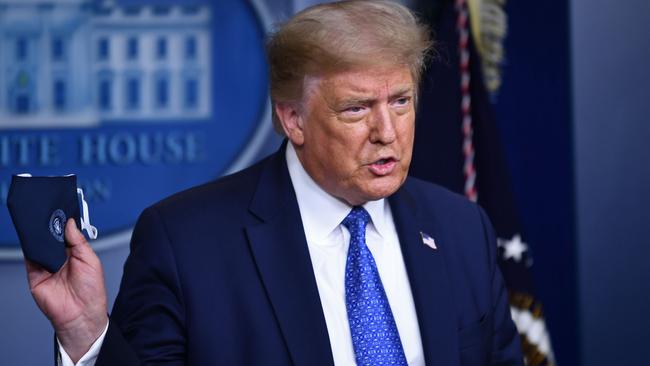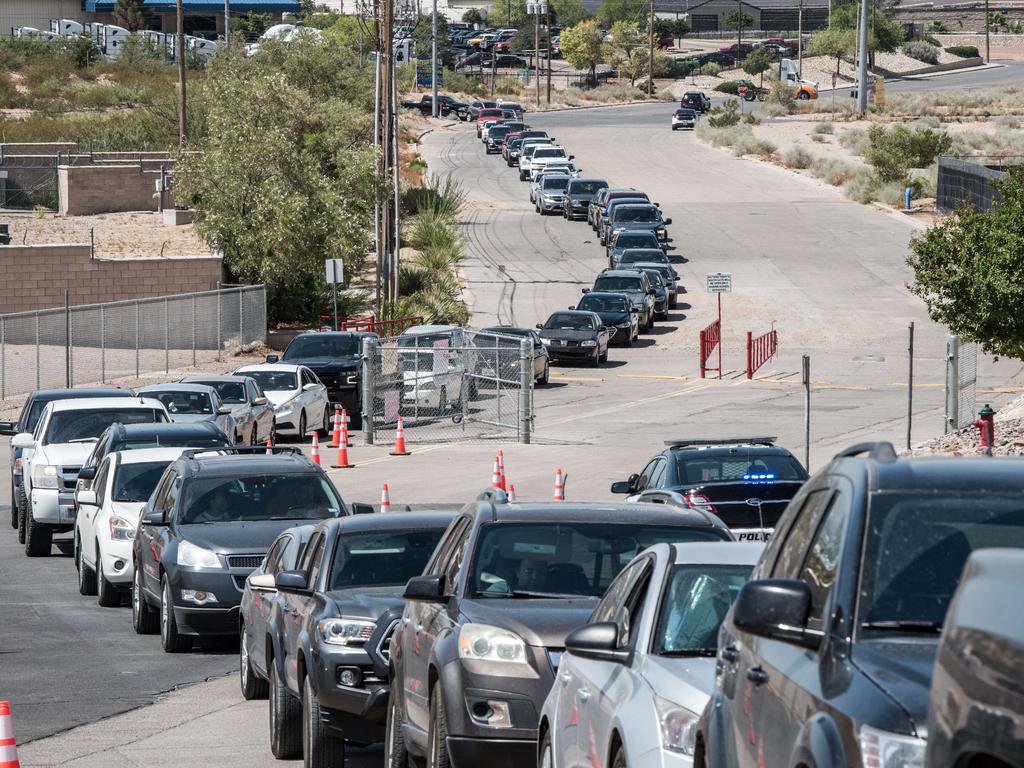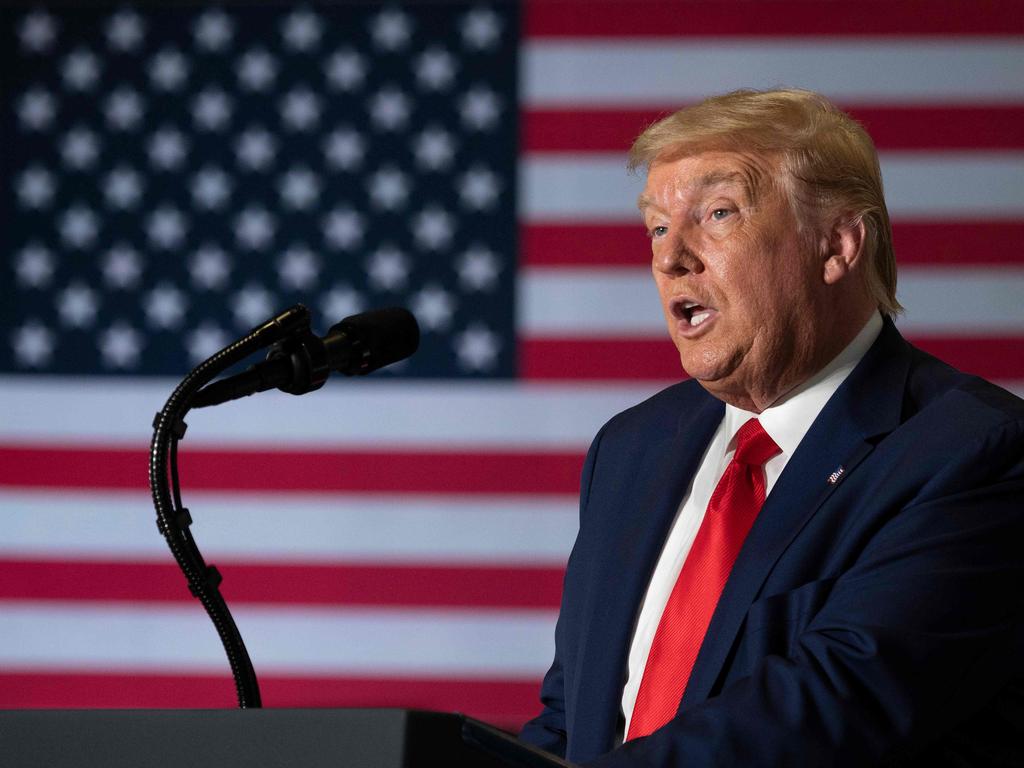Don’t write off Donald Trump’s re-election chances
Donald Trump is trailing in the polls but those polled skew toward the Democrats who are less likely to vote than Republicans.

Donald Trump prompted a predictable furore this week when he suggested in a Fox News interview that he might not accept the result of November’s election if it went the wrong way. “I have to see,” Mr Trump said. “No, I’m not going to just say ‘yes’. I’m not going to say ‘no’, and I didn’t last time either.”
The outrage was swift. Tyranny, they shouted. Nancy Pelosi, the speaker of the House of Representatives, said the president would be gone after the election, even if he had to be “fumigated” out of the White House.
Other Democrats and presidential critics in the media nodded along. Who would dare to refuse to abide by a constitutional process, using the levers of office to hold on to power by discrediting, undermining and perhaps even reversing the result of a fair election?
Well, the Democrats, for a start. In 2016, within hours of Mr Trump’s victory, a concerted effort was under way, using the powers of the state to discredit the election result, criminalise members of the winning campaign and undermine the legitimacy and effectiveness of the new administration before it took office.
Senior officials in the Obama administration put it about that Mr Trump had worked with the Russian government to get himself elected, accusing him, in effect, of treason. Law enforcement officials in the Obama Justice Department pursued an investigation on increasingly flimsy grounds against campaign officials and incoming members of the administration. New documents published in the past week show that the FBI knew there was no substance to the claims that the Trump campaign had worked with Russia but spent almost three years continuing to investigate.
So before we all ventilate about a Trumpian coup to overturn the result of November’s election, we should remember that attempts to delegitimise electoral outcomes are rooted in a firmly established bipartisan tradition.
Mr Trump has good reason to fear the result in November. With little more than 100 days to go, he trails his Democratic opponent Joe Biden by a wide margin. A recent average of polls by the website Real Clear Politics gives Mr Biden a lead of around 49 per cent to 41 per cent. At this stage in the campaign the only incumbent presidents in the last 50 years to trail their opponents by margins like this were Gerald Ford in 1976, Jimmy Carter in 1980 and George HW Bush in 1992. All three lost.
Pollsters, even Democratic ones, caution that there are several reasons to resist an early coronation of Mr Biden. Most of the polls reflected in the recent averages are polls of registered voters. These voters tend to skew towards Democrats but a smaller proportion of registered Democrats than Republicans actually vote. An 8-point lead among registered voters might translate into a 5-6 point lead among voters likely actually to go to the polls.
Then there is the in-built electoral college advantage demonstrated so well in the 2016 election. President Trump could lose the popular vote by as much as 3 or even 4 percentage points and still win the electoral college thanks to the fact that almost all states allocate their electoral votes on a winner-takes-all basis. In the biggest states the Democrats are likely to pile up massive popular numbers in California and New York while Mr Trump could win narrowly in Florida and Texas.
Still, there’s no denying Mr Trump’s predicament. Unless something changes between now and November 3, defying the official result may be the only way he will get to stay in the White House.
"Today, my Administration reached a historic agreement with Pfizer, to produce and deliver 100 million doses of their vaccine immediately following its approval." pic.twitter.com/U5aVxYj41i
— The White House (@WhiteHouse) July 22, 2020
For all the drama and noise of the last four years, the scandals, real and alleged, the tweets and the rhetoric, it’s clear that the fate of the Trump presidency is tied to the COVID-19 pandemic. While officials insist, with some justification, that the overall data suggest the US is doing no worse than the average of other major industrialised countries in terms of fatalities, Americans have become increasingly alarmed at what looks at best like nonchalance on Mr Trump’s part, and at worst dereliction of responsibility.
While most of the public health action in the US falls to the states, the federal government has a guiding role, co-ordinating efforts and communicating advice to the American people. It’s in this last area that Mr Trump, polls suggest, has failed completely.
For months the president has downplayed the threat from the coronavirus, ignored medical advice to emphasise safety, continually expressing misplaced optimism about cures and treatments and the course of the disease. “Implied in his message has been that the virus is all a hoax, not real, and not bad,” one political consultant tells me.
But polling suggests most voters – in particular older voters, who tend to lean strongly Republican – are deeply concerned about the virus and alarmed by their president’s apparent lack of seriousness in dealing with it. White House officials have been sounding the alarm internally for weeks.
Finally this week their message seems to have been received. On Tuesday Mr Trump resumed daily briefings from the White House. His tone was sombre. Sticking closely to a script, he advised Americans to wear masks, acknowledged that the outbreak was still spreading rapidly in a number of states and warned of the continuing danger. “It will probably unfortunately get worse before it gets better,” he said.
He was talking about the virus. The hope among his beleaguered campaign advisers is that he was also describing the trajectory of his political fortunes in this cataclysmic political year.
The Times







